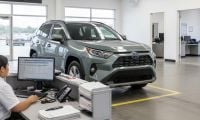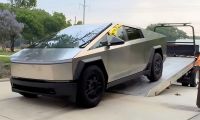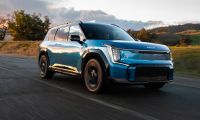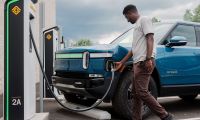Hyundai made two major announcements this week about mobility and hydrogen fuel that show the automaker is poised to revolutionize the way we think about moving. It’s some pretty exciting stuff that may not show dividends for years to come.
Most major is the fact that Hyundai will acquire a controlling interest in Boston Dynamics in a deal that values the mobile robot firm at $1.1 billion. This confirms a story I had posted last month.
At the time, I said the Hyundai dealership is going to look massively different probably by 2030. Boston Dynamics focuses on creating robots with advanced mobility, dexterity and intelligence. Its main philosophy is mobility sufficient to access both the natural and the built world requires legs.
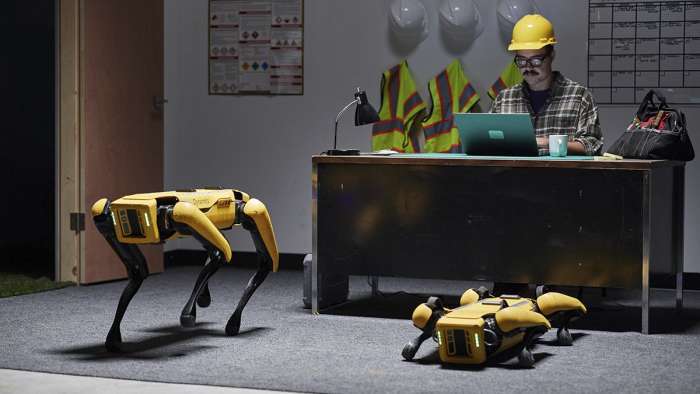
Hyundai said in making the announcement, advanced robotics offer opportunities for rapid growth with the potential to positively impact society in multiple ways. Boston Dynamics is the established leader in developing agile, mobile robots that have been successfully integrated into various business operations. The deal is also expected to allow Hyundai Motor Group and Boston Dynamics to leverage each other’s respective strengths in manufacturing, logistics, construction and automation.
Boston Dynamics has great products with a lot of potential. It just doesn’t have the means to manufacture them and turn a profit. That opens the doors for Hyundai.
As I wrote back in November, once a means is found to get these robots into [business and] consumers’ hands, it’s game over. The next generation will look at us with confusion on their face when we say, “I remember when Hyundai used to sell cars.”

Hyundai Hydrogen Fuel Future
Also last month, I pointed out Hyundai was poised to make a major announcement about hydrogen-fueled vehicles. Now it has with the launch of ‘HTWO’, a new brand to represent the group’s hydrogen fuel cell system. HTWO stands for ‘H2’, the hydrogen molecule, while also representing ‘Hydrogen’ and ‘Humanity’, the two main pillars of Hyundai’s fuel cell business.
OK, the part of representing humanity may have made me throw up in my mouth just a little bit. But, this move does represent the future.
With its next generation fuel cell system, Hyundai says it aims to offer a highly efficient and diversified lineup of hydrogen-powered vehicles. Where it might succeed is the vehicles aren’t just for consumers. Hyundai says this new hydrogen lineup will also include trains, vessels and its urban air mobility program.
Sure, hydrogen fuel consumer vehicles are having a difficult time getting off the ground in the US, but that doesn’t mean nothing has been accomplished in the last two decades Hyundai has been in this segment. Since marketing the world’s first mass-produced fuel cell electric vehicle ix35 in 2013, the group has been expanding its vehicle offerings powered by its fuel cell system such as Hyundai NEXO SUV, XCIENT Fuel Cell heavy-duty truck and a fuel cell electric bus, as zero-emission mobility solutions.
Keep an eye on this space. Just as in mobility, Hyundai is poised to become dominant in the hydrogen-fuel vehicle marketplace.

Hyundai Electric Vehicles
Let’s not forget the Korean automaker is hard at work on the Hyundai electric vehicle lineup. By 2025 Hyundai aims to sell 1 million electric vehicles globally. It took a giant step toward that goal recently with the reveal of a 10-vehicle EV lineup by 2022 that includes seven SUVs and three sedans. They include hybrid, plug-in, battery-electric and hydrogen fuel cell cars and SUVs for a full-spectrum eco strategy.
Hyundai has also introduced a new electric vehicle platform https://www.torquenews.com/108/hyundai-s-new-ev-platform-targets-tesla that will help the company in its goal to be an affordable, better alternative to Tesla. Hyundai’s Electric-Global Modular Platform (E-GMP), a dedicated battery electric vehicle (BEV) platform, gives the automaker more flexibility and enhanced performance for its EVs.
An affordable alternative (affordable being a relative term because no EV is cheap) like those being offered by the Korean automaker are going to be game changers. The issue becomes crucial as more countries seek to limit or ban internal combustion engine vehicles by 2025.
Set as google preferred source







